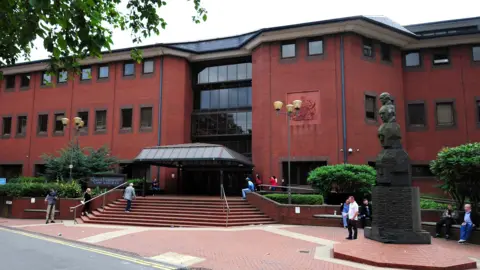Asylum seeker found guilty of raping woman, 18, in Nottinghamshire park
 PA Media
PA MediaAn asylum seeker has been found guilty of two counts of raping an 18-year-old woman in a park in Nottinghamshire.
A trial at Birmingham Crown Court heard the woman had been drinking at Sutton Lawn park in Sutton-in-Ashfield when she was attacked by Sheraz Malik, shortly after being raped by another man he was with, who has yet to be identified.
Malik, 28, had claimed the sex was consensual, but the jury returned unanimous guilty verdicts on two counts of rape and a not guilty verdict on a third.
It can be now reported that Malik is an asylum seeker who was born in Pakistan and lived in Italy, Germany and France before coming to the UK.
Judge Simon Ash KC adjourned the case for a mention hearing on 6 February so a date for sentencing Malik – who lived at an address in Bath Street in Sutton-in-Ashfield at the time – could be fixed.
A reporting restriction was put in place at Nottingham Crown Court in September last year, preventing any mention of the defendant’s immigration status until the trial had concluded.
Police said another suspect was still being “relentlessly” sought in relation to the case.
The case had prompted protests in the town after Lee Anderson, Reform UK MP for Ashfield, posted about it on social media.
After highlighting the suspect’s background on his Facebook and X accounts, demonstrators gathered in the town to demand tighter rules on immigration.
Counter-protesters also turned out, but Nottinghamshire Live reported these were outnumbered.

Warning: This article includes details that some readers may find distressing
Prosecution counsel Nicholas Corsellis KC previously told the court the woman had been drinking at the park with a male friend, and was drunk when she met Malik and a group of other men, who she had never seen before.
Her friend asked the group to “look after” her while he went to meet another friend and one of Malik’s associates took the woman to an isolated area of the park so she could go to the toilet, the court heard.
Corsellis said: “The first man forcibly raped her before bringing her back to the group.
“The defendant then decided he wished to have sex with her and took his turn to take her to a secluded spot, where he physically struck her while raping her.”
The jury were told Malik had grabbed her by the neck and hair as he raped her, and afterwards she sent a Snapchat message to a friend saying “please help me”.
“The one you told to look after me tried to rape me… and the one with the black T-shirt,” the message said.
“Please help, I can’t cope, I feel like killing myself.”
Corsellis told the jury that the complainant was “alone, drunk and was obviously a vulnerable person”.
 Google
GoogleMalik, who gave evidence in English during the trial, said he had been playing cricket with a group of other men and smoking cannabis in the park before the attack.
He denied he had slapped her at any point and claimed the woman had told him “I really like you” and “I really enjoyed it”.
Later in his evidence, Malik was asked why a different name had been used to book him a coach ticket to leave the Nottinghamshire area after the attack.
He said a friend had booked the ticket for him, adding that the Home Office was “giving me £50 for every week”.
Addressing Malik in the dock, the judge said: “You have been convicted of very serious charges and I will need to sentence you in due course.
“The case will next be listed on 6 February to fix a sentence date.
“I have ordered a pre-sentence report to assess the level of dangerousness. You must engage with the probation service when they seek to engage with you.
“You will be remanded into custody at this stage.”
In a statement after the sentencing, Nottinghamshire Police confirmed Malik was a Pakistani national who followed proceedings through a Pashto interpreter.
The force said the investigation remained a priority.
Det Insp Nicole Milner said: “As is always the case for investigations of this nature, there are many people involved and they have all played a part to bring Malik to justice.
“I particularly want to acknowledge the work of Det Con Malgorzata Kacprzycka and Det Sgt Barry Haines, who have been crucial in bringing Malik to justice.
“Above all, I also want to acknowledge the bravery and resilience of the victim.
“She has shown great courage throughout and helped us to build a very strong case against Malik, whose version of events lacked credibility from the start.
“As a result of her evidence, the jury was able to see through his lies and to convict him on three counts of rape.”

